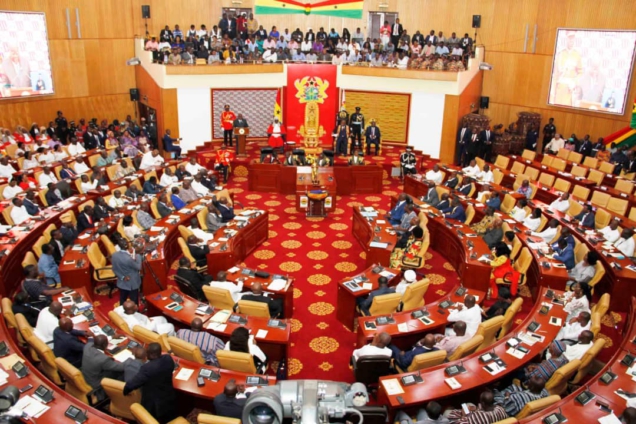adverts
In a closed-door session, Ghana’s Parliament is deliberating on the emoluments for officeholders under Article 71 of the Constitution, focusing on the executive and the judiciary.
This marks the latest round of discussions on a long-standing constitutional provision that governs the salaries, allowances, and benefits for specific public officeholders.
Under Article 71, certain public officials, including the President, Vice President, Chief Justice, and other key figures in the executive and judiciary, are entitled to compensation based on a system of approval by a designated committee.
adverts
The arrangement mandates that these officials receive their salaries in arrears, with payments finalised after their tenure. Any outstanding salary balance is settled at the end of their service.
A crucial element of the system is the ex gratia payment, made to these officeholders at the end of their service, which is calculated using a formula defined in the Constitution.
The approval process for these benefits involves both Parliament and the executive, with each body responsible for setting the emoluments for their respective counterparts. Specifically, Parliament approves the salaries for executive and judicial officers, while the executive determines the emoluments for Members of Parliament (MPs), the Speaker, and Deputy Speakers.
The reciprocal nature of this arrangement has been widely criticised for fostering a “scratch my back, I scratch your back” mentality, with critics arguing that the system lacks transparency and accountability. This has been a subject of concern, especially in light of Ghana’s economic challenges and the perceived imbalance between the generous benefits of public officials and the limited compensation afforded to ordinary public sector workers.
Article 71 outlines the framework for determining the emoluments of several key public officeholders, including:
- The President and Vice President
- The Speaker and Deputy Speakers of Parliament
- Members of Parliament
- The Chief Justice and Justices of the Superior Courts
- Ministers, Deputy Ministers, and Members of the Council of State
- The Auditor-General and other independent constitutional officers
The Constitution also stipulates retirement benefits for these officeholders. In the case of MPs, Articles 98 and 114 ensure they are entitled to salaries and allowances as determined by Article 71, with those serving at least four years eligible for gratuity payments upon leaving office or in the event of their death.
The debate over Article 71’s fairness and transparency has grown louder in recent years, particularly amid the country’s economic struggles. Critics argue that the system is outdated and disproportionate, benefiting a select group of public officials while ordinary public sector workers face much lower pay and benefits.
In response, there have been increasing calls for constitutional reforms aimed at revising the current emolument system to reflect the country’s fiscal realities.
However, amending such an entrenched provision remains a contentious issue, with many questioning the political will to push through changes.
Incoming President John Mahama has taken a firm stance against the Article 71 ex gratia arrangement, pledging to scrap it entirely.
However, it remains unclear how quickly or effectively these reforms can be implemented given the constitutional hurdles involved.
Source: myjoyonline.com


